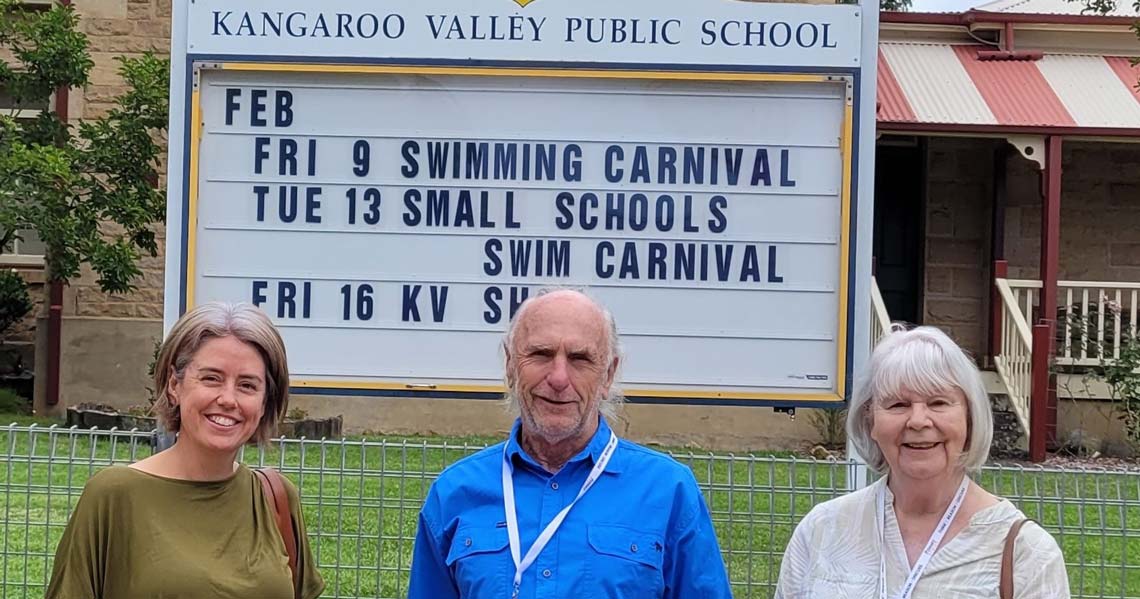Every Thursday in term time, three trained volunteers teach ethics at Kangaroo Valley Public School. In ethics classes, children from kindergarten onward are guided to develop their skills in critical thinking, ethical reasoning and respectful discussion. Ethics lessons explore everyday ethical issues such as truth and lying, getting even, being fair or unfair, cheating and friendship.
Michael Cox is entering his seventh year as an ethics volunteer. He started out teaching his grandchildren but they’ve moved on. Michael stayed because he wanted to keep contributing within his community and finds the course materials “excellent” and personally interesting.
“The course explores how we humans derive our sense of right and wrong and our principles such as honesty, fairness and equity, how we can live together in a way that facilitates human flourishing and wellbeing. We could do with a bit more of all that,” Michael says.
The capacity to evaluate
‘In these times where there is increasing blurring of what’s true and what’s not and lapses of ethical behaviour in some of our social institutions, I think children need to be equipped with the skills to reason out ethical dilemmas and to engage in respectful dialogue with others. And to develop the capacity to evaluate and make their own considered judgements about what they see, hear or read and to become proficient at spotting bias.”
Irene Dungey has also been volunteering for several years – in fact she taught ethics in Dapto and Port Kembla before moving to Kangaroo Valley.
“Initially, I was retired and searching for something to volunteer for in the community. When I heard about the ethics program, I was excited at the prospect of teaching something I believed in. I found my initial training excellent and we were given feedback that was very useful.
“When the fires went through the valley in 2020/21 our house was destroyed. By the time I was back on my feet I heard that ethics had started at our local school and here I am.”
Gai Halcrow also initially began teaching ethics outside of Kangaroo Valley. “I first volunteered for Berry Primary School when my child was in preschool. Then when he started at our local small school here in Kangaroo Valley, I joined Michael and started teaching my son as part of the kindergarten class. We are now up to Grade 4.”

Each of these volunteers greatly enjoys teaching ethics.
Says Michael, “I sometimes feel quite inspired by the ability of the children to address complex issues … when a child comes up with an insightful way of looking at a problem we’ve posed and others pick up on this and make a further contribution, even though there may be no clear black and white answer.
“I feel I’m making some humble contribution to the emerging generation of good citizens and community members. I would hope they feel that it has been of benefit to them in developing ways of figuring out what’s okay and why it is okay – or not. And we have a bit of fun.”
Irene echoes this. “The lessons constantly make me rethink some of the ideas I had about certain topics and hearing the children’s perspective is encouraging to me.
“I enjoy the interaction with the students. Giving them the space and time to think about the reasons for their decisions is, I believe, a big step towards them understanding and thinking more deeply about the question. Hearing what others think and say can guide their mind to thinking in another direction, other possibilities.”
What are Gai’s reasons for volunteering with Primary Ethics? “Firstly, volunteering with small schools is a really lovely way of being a part of this community. Secondly, I’m an aid worker by profession and I’ve always appreciated the values and ideas behind ethics and the types of discussions we have around social justice issues. Thirdly, the kids! Each ethics circle as the years have progressed, they bring their own perspectives and ways of thinking through topics.”
Pro-social behaviours
Michael explains how he came to be an ethics teacher. “I had never taught children before, but as a grandparent I have a personal interest in fostering the ability of children to think for themselves, solve problems in living and develop pro-social behaviours. Having retired from work I had the time available.
I undertook a two day in-person training course [there are also fully-online training courses]. I did not find the course material difficult, I think it is excellent and well thought out.”
Michael estimates that he spends 30 to 60 minutes in preparation each week, a bit of time printing out material [some people read the lesson scripts from a tablet], 20 minutes each way in travel. Kangaroo Valley’s class time is 50 minutes.
“The classes are discussion-based and follow a clear format provided in the lesson script each week. I don’t impose my own views but try to draw out ideas from the children using the course material provided. Questions are posed, stories read that raise issues for consideration within the group or sometimes in pairs.”
Irene feels that being an ethics teacher is a privilege. “To have the opportunity to teach children ethics is a fulfilling and rewarding experience.”
Gai agrees. “It’s a privilege and it’s great to have our little valley school be able to support this program and to have our numbers grow to the point we can offer three classes this year.”
In fact there is demand for a fourth ethics class at Kangaroo Valley Public School in 2024 but all ethics lessons require a volunteer to teach them. If you have a spare hour a week on Thursdays, find out more about what is required on our website. To chat about options, call the helpdesk between 9am-5pm on weekdays on (02) 8068 7752.